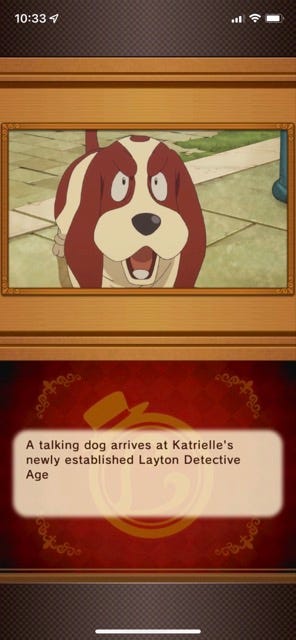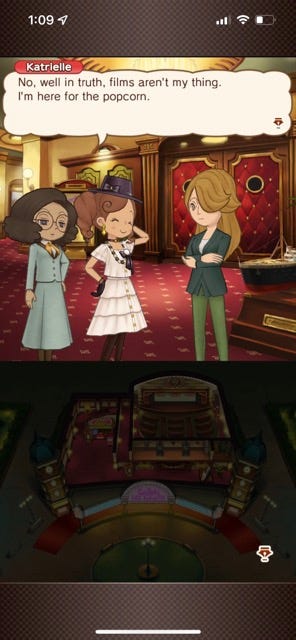The Real Layton Mystery
Why is this game on Apple Arcade?
I did not finish Layton's Mystery Journey.
About a quarter of the way through I had to make the decision to either keep pushing through or stop and cut my losses. I suspect this problem (knowing when to stop playing a game) is especially acute for a certain type of person who plays a lot of different games. And that person is also the type of person who'd start a blog about video games. But I think the question is interesting in general, how do we know when to stop playing? There is so much stuff available in the world and there's immense pressure to stop playing a game if it's not immediately rewarding.
The Mystery Journey
First, a little bit about Layton’s Mystery Journey. It's hard to dislike: the art style and the writing are reminiscent of Studio Ghibli or Pixar. The characters are charming and off-beat and the story is smooth enough to keep the game moving forward. The plot gets delivered to you by a combination of cut scenes (fully animated), dialog between characters (the primary method), and exposition by our main character. As a port of a Nintendo 3DS game, you spend most of your time interviewing characters, finding hidden objects, and solving brain teasers in order to unlock the story and move the plot forward.
The brain teasers, the main game-y parts of the game, were fun but somewhat simplistic. I was able to either brute force them by guessing and checking, or doing the math. From previous experience with playing a Layton game, I also knew that the puzzles tend to start out easy and then jump in difficulty as the game moves along.
It was obvious the game was a port (the screen is divided into two sections to mimic a 3DS) but successful enough to navigate without much hindrance. Though, it was annoying having to do basic things like navigate to the menu to click “Save” every few minutes to make sure I didn’t have to pick the game back up at an inopportune moment.
I completed somewhere in the ballpark of 15 small puzzles in a three-hour period, but I felt like I spent most of my time clicking through dialog or following instructions to get to the next bit of the game. I made it through two cases and decided I'd had enough of the game. Basically, I found it boring.

Knowing When to Stop
It’s easy with games to stop too quickly. For instance, I wouldn't have finished Tangle Tower if it weren't for this little project. I kept allowing myself to be stymied by my misunderstandings of how the game worked. On my first pass through Tangle Tower, I stopped too early.
There are basically two steps we go through when learning to play a new game: building a mental model of how the game works and then using that mental model to play the game. It’s hard to really know whether or not we’ll enjoy the game until we actually get to step two, and it’s not necessarily the games’ fault if step 1 takes too long. Sometimes concepts are hard to communicate!
In fact, I think people will drop a game during the “building a mental model” phase because they think it means they won’t like the rest of the game. In Think Again, by Adam Grant, he notes people will rate lectures as both more enjoyable and more educational than they will things like quizzes or interactive assignments. But when they're tested on the material later, the data conclusively shows that people learn more from interactive assignments (i.e. stuff where we can fail and be corrected).* Basically, we're really bad at knowing whether or not we're learning something. Because games rely so much on that learning piece, they have to do things that might feel bad at the moment even if the payoff is worth a lot.
With other pieces of art, there are more opportunities for our brains to latch onto stuff that's exciting: maybe a rhythm, the beat, or the sound of the performer's voice with music or the tone or mood in a good piece of writing. But with many games, the challenge is also the form of enjoyment. This means we have to dig through our frustration and understand if we're frustrated because it's hard and we're learning or if we're frustrated because it's not a great fit.
How Should We Rate Older Games on Newer Platforms?
So this comes down to a couple of questions:
Am I dropping Layton’s Mystery Journey too early?
Am I rating this game lower because it’s older and is it deserved?
For the question of dropping the game too early, I decided the answer is no. Getting through two cases (out of 12) was probably enough for me to get a pretty good sense of what’s going to happen in the game. While the tutorials would probably fade away, the amount of dialog that I had to click through would not (and clicking through rapidly on an iPhone is not easy because there are no physical buttons).
For the second question, am I rating the game worse because of its age? The answer is clearly yes, but I don’t think that’s a problem in this case. Layton's Mystery Journey was published in 2017, but the original Layton came out in 2007 and the series has been following the same sorts of (successful) patterns ever since. It's hard to tell how much I should push to learn and appreciate older forms of the art and how much I should critique them for using old tropes. This is especially challenging in games where the pace of technology can lead older games to feel outdated very quickly (if you don't put the time in), even though they have interesting insights and mechanics. It's also not like Layton's Mystery Journey is one of the hallmark games in the series either. If there were a classic 3DS game ported to Apple Arcade, it would be a different conversation.
Can Apple Arcade Make Better Games?
There’s a couple of things game designers can do to get players to that second step:
Lean into existing tropes and spend less time explaining things
Make the game shorter
Games that follow similar tropes that we’ve played before make it easier to get to step two because we already know the tropes and concepts to work through. Services like Apple Arcade can help with this by grouping games together by these sorts of ideas and leading players towards games and experiences they enjoy. This is the sort of place where Apple investing more in the interface of Arcade would be really helpful, instead of just dumping it in a “Storefront”. Imagine Netflix but without recommendations.
The other challenge about the length of tutorials is that most games are too damn long. There’s a lot of angst in the game space around providing enough experience for the money (20+ hours for “small” games or 60+ hours for big ones), which means designers have to load up a lot of concepts in step one to get players the pay-off in the second part of the game. With a subscription service, the calculus between “getting your value” out of a game would get lessened slightly, because the game is “free” if you’re already in the service that you’re paying for. Shorter games mean less to explain, and more time spent on the interesting pieces.
It’s not too hard to imagine a different game that shared familiar Layton ideas, the brain teasers, the fun writing, the point-and-click collectibles, but that structure the pacing to fit better with a mobile experience. However, that sort of game would have to be iOS first and require more commitment and interest from Apple to produce those sorts of games.
Who Is Layton’s Myster Journey+ For?
For one thing, the game doesn’t feel like it’s built for a phone. Some of the common tropes of mobile games are that they should be easy to pick up and put down for 5 minutes at a time, they should automatically manage your saves, and it should be not too hard to figure out where you were at the last time you played if it’s been a while.
The game originally showed up on iOS as a capital-P Premium title for $17. The Apple Arcade version is technically called Layton Mystery Adventure Plus. From Level-5’s perspective, porting the game to iOS might make sense as an opportunity to capture more players, or resell the game to existing players who no longer use their 3DS but enjoyed the first time they played.
The decision to “+” Layton’s Mystery Journey leads me to believe that Apple looks for polished games with strong visuals and capable UX that they can entice developers to modify slightly (removing ad-tech for example) for Apple Arcade. What I am more skeptical of is the idea that there's a large overlap between people who are excited about the Layton series and people who also own Apple Arcade. That feels like the type of swing that a big subscription service might take, but not one that's struggling to get off the ground. Layton's puzzles and writing are too sophisticated to really be for children and people who love Layton probably own a 3DS or Switch. The game feels somewhat tacked onto a service that continues to focus on triage rather than creating a strategy for growing the service. Layton’s Mystery Journey feels like it was brought to Apple Arcade because it fits Apple’s requirements, not because it is particularly interesting to anyone who plays mobile games.
The Verdict
If you really love Layton, you probably already own a 3DS. However, if you’re looking for a classic Layton fix I would point you towards the Layton Trilogy Bundle. It’s a full $30 but you’re going to get a lot of content with classic Layton adventures. A bit rougher around the edges, but also a bit closer to home in terms of the classic format. And if you're a fan of point-and-click adventures I would take a look at my past review of Tangle Tower, an altogether better mobile gaming experience.
Up next we've got Jenny LeClue: Detectivu. It's gonna be a doozy.




